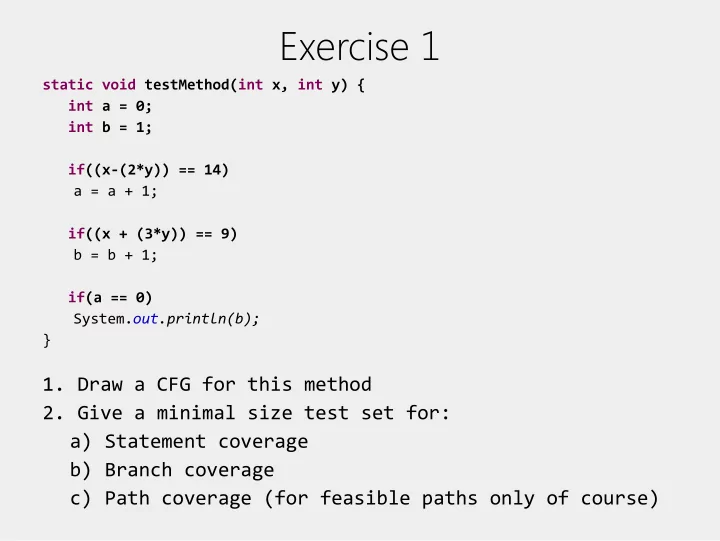

Exercise 1 static void testMethod(int x, int y) { int a = 0; int b = 1; if((x-(2*y)) == 14) a = a + 1; if((x + (3*y)) == 9) b = b + 1; if(a == 0) System. out.println(b); } 1. Draw a CFG for this method 2. Give a minimal size test set for: a) Statement coverage b) Branch coverage c) Path coverage (for feasible paths only of course)
Statement coverage START { { x = 12, y = -1}, int a = 0; { x = 0, y = 0} } int b = 1; Branch coverage Same as statement coverage t (x-(2*y)) == 14 (at least in this exercise) f a += 1 Path coverage (feasible paths) { (x + (3*y)) == 9 t { x = 12, y = -1}, b += 1 f { x = 0, y = 0}, a == 0 t { x = 6, y = 1}, f println(b) { x = 16, y = 1} END }
Exercise 2 Write a black-box test set for the ArrayList<E>.get(int index) method. Write your test as a JUnit test. Specification: public E get(int index) Returns the element at the specified position in this list. Parameters: index - index of the element to return Return rns: the element at the specified position in this list Throws: IndexOutOfBoundsException - if the index is out of range (index < 0 || index >= size())
@Before List jimmy = new ArrayList< int >(); Not so bad but most of the tests are performed on an @Test empty list so only a special public void TestValidIndex(){ int n = 0; case is covered jimmy.add(n); Assert.equals(n, jimmy.get(0)); } @Test (expected=IndexOutOfBoundsException. class ) public void TestInvalidIndex(){ jimmy.get(1); } @Test (expected=IndexOutOfBoundsException. class ) public void TestIndexLessThanZero(){ jimmy.get(-1); } @Test (expected=IndexOutOfBoundsException. class ) public void TestIndexGreaterThanSize(){ jimmy.get(jimmy.size()+1); }
@Test(expected = IndexOutOfBoundsException. class ) public void testUpperIndexOutOfBoundException() throws IndexOutOfBoundsException{ ArrayList<String> testList = new ArrayList<String>(); testList.add("a"); testList.get(-1); } @Test(expected = IndexOutOfBoundsException. class ) public void testLowerIndexOutOfBoundException() throws IndexOutOfBoundsException{ ArrayList<String> testList = new ArrayList<String>(); testList.add("a"); testList.get(1); } public void testUpperBoundary() throws IndexOutOfBoundsException{ ArrayList<String> testList = new ArrayList<String>(); testList.add("a"); testList.add("b"); testList.add("c"); assertEquals("c", testList.get(2)); } public void testLowerBoundary() throws IndexOutOfBoundsException{ ArrayList<String> testList = new ArrayList<String>(); testList.add("a"); testList.add("b"); testList.add("c"); assertEquals("a", testList.get(0)); } Not so bad
Exercise 3 Write a black-box test set for the Comparable<Integer>.compareT o (Integer o) method. Write your test as a JUnit test. Specification: Compares this object with the specified object for order. Returns a negative integer, zero, or a positive integer as this object is less than, equal to, or greater than the specified object Para rameters: o - the object to be compared. Return rns :a negative integer, zero, or a positive integer as this object is less than, equal to, or greater than the specified object. Throws: NullPointerException - if the specified object is null ClassCastException - if the specified object's type prevents it from being compared to this object.
public static Integer WOOD_DAVERS = 14; Not bad regarding //Test @Test (expected = NullPointerException. class ) equivalence partition, could public void TestNullComparisonObject() { Integer cats = null ; be better for boundary WOOD_DAVERS.compare(cats); testing } @Test (expected = ClassCastException. class ) public void TestInvalidCastComparisonObject() { String cats = “CATS”; WOOD_DAVERS.compareTo((Integer) cats); } //Test Less Than @Test public void TestLessThanInteger(){ Integer lessThan = 12; Assert.equals(-1, lessThan.compareTo(WOOD_DAVERS)); } //Test Greater Than @Test public void TestGreaterThanInteger(){ Integer greaterThan = 17; Assert.equals(+1, greaterThan.compareTo(WOOD_DAVERS)); } //Test Equality @Test public void TestEqualToInteger(){ Integer EQUAL = 14; Assert.equals(0, lessThan.compareTo(WOOD_DAVERS));
Recommend
More recommend